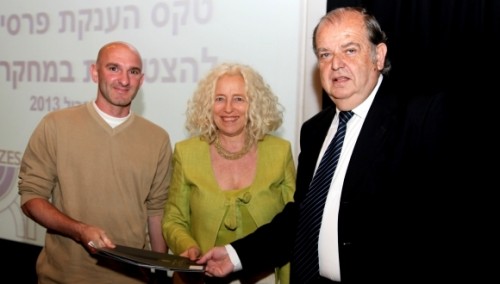"The Israeli winners of the Horizon 2020 ERC grants maintain Israel's position as a leading player"

The European Research Council (ERC) published on Friday the results of the call for ERC Consolidator grants for 2015, a track intended for researchers who are between 7-12 years after receiving their Ph.D. Among the 302 winners of the grant, 14 winners are from Israeli institutions, with Israel placing 6th in the number of winners out of 22 countries that won this year. Israeli winners make up about 5% of all winners - three times Israel's relative contribution to the program's budget. The calling voice budget was €585 million, of which €28 million was awarded to researchers from Israel. Avi Hasson, Chief Scientist at the Ministry of Economy and Industry: "The current Israeli success, which joins the ongoing success of Israeli researchers in ERC grants, testifies to the far-reaching capabilities of the academic research community in Israel and is highly regarded throughout Europe."
Israel manages to maintain its position as a global innovation powerhouse. Last Friday, the European Research Council published the results of the call for ERC Consolidator grants for 2015, a track designed for researchers who are between 7-12 years after receiving their doctorate, and the Israeli results are impressive: out of 2051 applications submitted from all over Europe, 302 were selected for funding, of which - 14 winners are from Israeli institutions. Thus Israel is placed 6th in the number of wins out of 22 countries that won this year. The Israeli winners are from the following institutions: the Hebrew University (6 winners), the Weizmann Institute of Science (4 winners), Tel Aviv University (2 winners), Bar-Ilan University (1 win) and the Technion (1 win).
The general distribution of winners is divided into 94 companies from the field of life sciences, 141 from the field of exact sciences and engineering and 67 from the humanities and social sciences. Each winning project benefits from a budget of approximately 2.5-2 million euros, for a period of five years.
One of the winning Israeli projects is the research of Prof. Rotem Shurk, from the Weizmann Institute of Science. His research seeks to study the immune system of bacteria that have developed a sophisticated acquired immune system called crispr - a sort of molecular "scissors" with which they fight attacks by viruses against them. Understanding this immune system can certainly be the channel for the development of the next generation of drugs against genetic diseases.
Another interesting study is by Prof. Tomer Volansky from Tel Aviv University. According to many observations made at the university, Prof. Volansky's team of researchers discovered that more than 80% of the matter in the universe is dark matter and completely different from the matter we see around us. The identity of that dark matter is still unclear. For over three decades, extensive efforts, both theoretical and experimental, have been devoted to revealing the identity of dark matter, but most of the searches focus on a certain type of dark matter. The state of affairs today indicates a significant need to expand scientific investigation in new directions. So what is dark matter?
Avi Hasson, Chief Scientist at the Ministry of Economy and Industry, and Chairman of the Diaspora Committee of ISERD - the Israeli administration for European R&D: "The current Israeli success, which joins the ongoing success of Israeli researchers in ERC grants, testifies to the far-reaching capabilities of the academic research community in Israel and is greatly appreciated all over Europe. Preservation and promotion of this status alongside the successes of Israeli industry in general in the Horizon 2020 programs, which is the largest program in the world that promotes collaboration between industry and academia, are an integral part of the activities of the Scientist's Bureau.

2 תגובות
In Europe and the USA and East Asia and even China, the awareness that it is necessary to connect academia with industry is clearer, there are academic institutions there whose purpose is this goal and thus they increase the number of doctors who can work in research. For example with the ISMB Institute in Milan/Turin.
Here I saw astronomy studies - and it is not clear to me if this includes industry. ISERD also encourages connections with industry.
A very important grant. Covers a promising layer of researchers. With all our curses on the European nation we are tied to its navel as a civilization and Bibi (agreed or disputed by some of us) for example makes sure to hug Frederica Mogherini more than Bozzi or Tzipi, and go to Germany. It doesn't seem to me that he is Frederica's opinion dead.